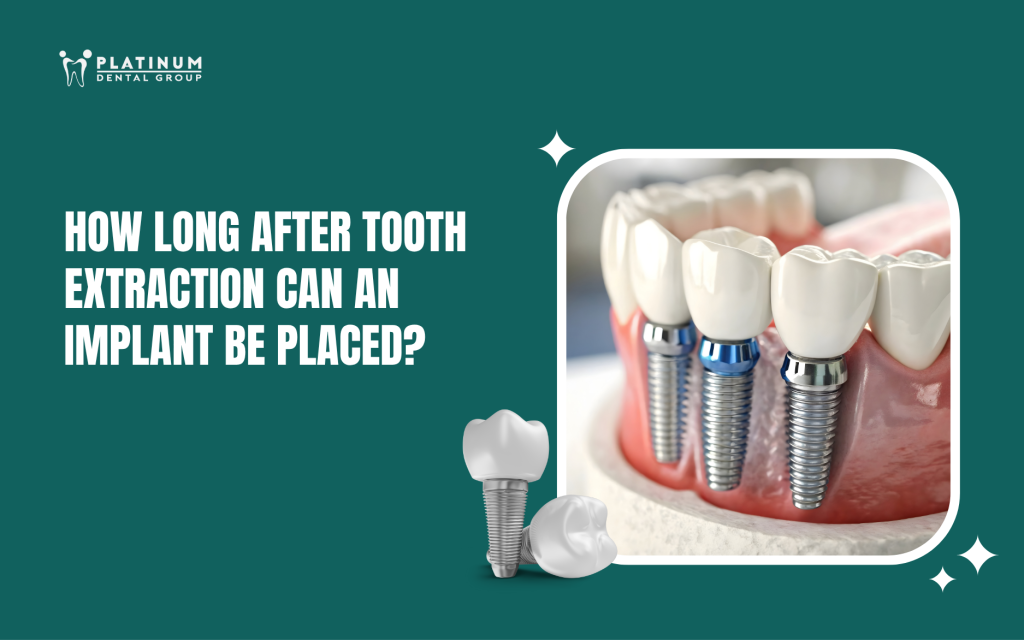Side Effects of Dental Implants: Common Complications and How to Prevent Them
Many people worry about whether dental implants can negatively affect their health. In fact, implant dentistry is a safe, modern, and long-term solution for tooth loss. Dental implants themselves are not harmful — side effects of dental implants only occur when the procedure is not properly performed or when post-operative care is inadequate. Understanding potential risks and prevention methods will help you feel more confident when choosing implants as your tooth replacement option.
Nội dung bài viết
- 1 Common Complications After Dental Implant Surgery
- 1.1 Infection and Peri-Implantitis
- 1.2 Prolonged Pain and Swelling
- 1.3 Nerve Damage
- 1.4 Bone Loss Around the Implant Neck
- 1.5 Implant Rejection or Fracture
- 1.6 Jaw Fracture
- 1.7 Allergic Reaction to Implant Material
- 1.8 Systemic Complications in Patients with Underlying Health Conditions
- 1.9 Difficulty Chewing After Implant Placement
- 2 Main Causes of Dental Implant Complications
- 3 How to Prevent Complications and Ensure Safe Dental Implant Treatment
- 4 Frequently Asked Questions (FAQs)
Common Complications After Dental Implant Surgery
Although dental implants are generally considered safe and effective, improper procedures or poor post-surgery care can still lead to certain complications:
Infection and Peri-Implantitis
Infection is the most common complication after dental implant surgery. Normally, after the procedure, the gum tissue around the implant needs time to heal and integrate with the jawbone.
However, if the surgical environment is not properly sterilized, or if the patient maintains poor oral hygiene, bacteria can easily enter and cause inflammation or infection.
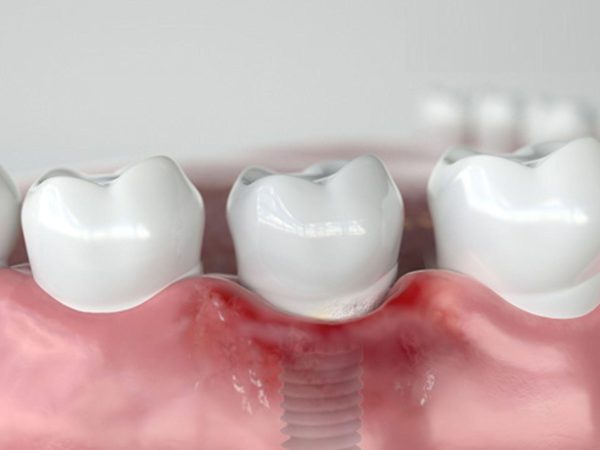
Patients may notice symptoms such as red, swollen gums, pain, bleeding, or even pus around the implant post. If the inflammation is not treated promptly, the implant may become loose, fail to bond with the bone, and eventually need to be removed — resulting in an unsuccessful implant procedure.
Prolonged Pain and Swelling
Pain and swelling after surgery are the body’s natural responses and usually subside within a few days. However, if the pain lasts longer than a week or becomes increasingly severe, it may indicate a complication. Common causes include incorrect implant placement, proximity to a nerve, or poor osseointegration between the implant and jawbone. In other cases, prolonged pain may be related to peri-implantitis (inflammation around the implant). This condition not only affects daily comfort but can also directly threaten the overall success of the implant procedure.
Nerve Damage
One of the possible side effects of dental implants is nerve injury. This occurs when the dentist places the implant too deep or at an incorrect position, causing compression or accidental contact with the nerves in the jaw area. Patients may experience numbness in the lips, tongue, or chin, or a persistent tingling or prickling sensation. In many cases, this sensation can become permanent if not treated promptly. Nerve damage not only causes discomfort but also affects chewing, speaking, and overall quality of life.
Read more: General information about the cost of full mouth Dental Implants
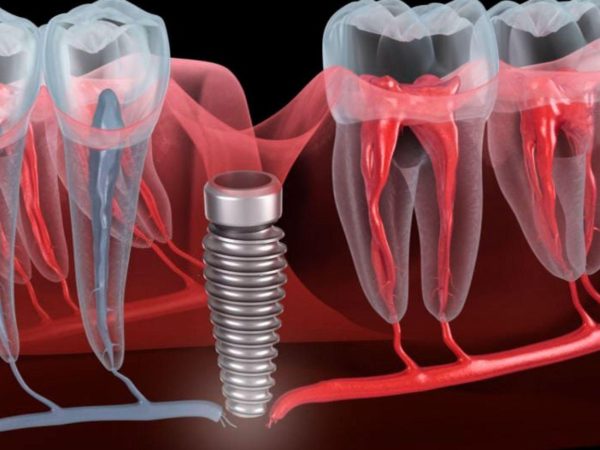
Bone Loss Around the Implant Neck
Bone loss around the implant is a serious complication, often caused by chronic peri-implant inflammation or failed osseointegration. When the bone surrounding the neck of the implant deteriorates, the post loses its stable foundation, leading to looseness or even implant loss. Beyond compromising the implant’s durability and function, bone loss also weakens the jawbone structure, making future restorations more difficult. This is one of the main reasons why an implant may fail or lose effectiveness in a relatively short time.
Implant Rejection or Fracture
Although dental implants are highly durable, in some cases the body may reject the implant post. This can result from an immune response, material incompatibility, or the use of low-quality implants. Additionally, the implant post may crack or fracture during chewing if the material does not meet quality standards or if it is exposed to excessive force.
When implant rejection or fracture occurs, patients often experience pain and discomfort — and may need an additional surgical procedure to replace the implant, leading to more time and higher costs.
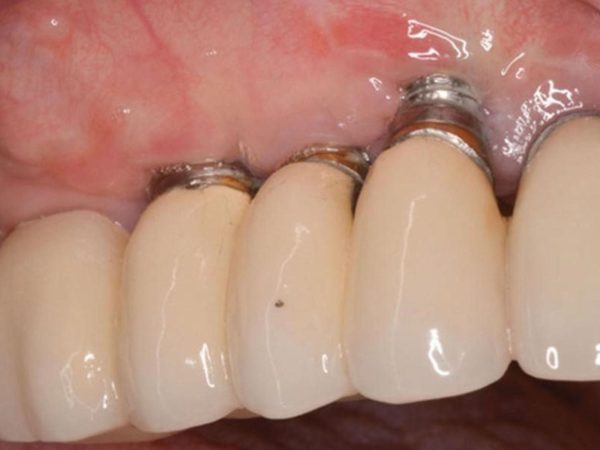
Jaw Fracture
This is a rare but extremely serious complication. Jaw fractures usually occur in patients with poor bone density or thin jawbone who undergo implant placement without proper support procedures such as bone grafting. When an implant is placed in a bone that lacks sufficient strength, the applied force may cause cracks or fractures in the jawbone. This complication leads to severe pain, affects jaw structure, and requires a much more complex treatment process compared to standard implant cases.
Read more: An overview of all on 4 Dental Implants
Allergic Reaction to Implant Material
Most dental implant posts today are made from titanium, a material known for its high biocompatibility and very low risk of allergic reaction. However, a small percentage of patients may be sensitive to titanium or to other compounds present in the implant. An allergic reaction may manifest as swelling, redness, prolonged pain, or persistent discomfort at the implant site.
In severe cases, the implant may be rejected prematurely, requiring removal and replacement with an alternative material.

Systemic Complications in Patients with Underlying Health Conditions
For patients with chronic conditions such as diabetes, heart disease, high blood pressure, or blood clotting disorders, dental implant surgery should be carefully evaluated. If these medical conditions are not well-controlled, there is an increased risk of infection, prolonged bleeding, or failed bone integration. In addition, certain medications taken by the patient may also interfere with the healing process after surgery.
Therefore, conducting a comprehensive health assessment before implant placement is essential to minimize the risk of systemic complications.
Difficulty Chewing After Implant Placement
After receiving dental implants, some patients report difficulty chewing, food getting stuck, or a sensation that their bite feels different from natural teeth. This issue often results from misaligned implant placement, an improper bite (occlusion), or a crown that hasn’t been properly adjusted.
If this condition persists, it can not only affect eating comfort but also cause tooth wear, temporomandibular joint (TMJ) pain, and reduce the overall effectiveness of the restoration.
Explore: General information about full mouth Dental Implants near me
Main Causes of Dental Implant Complications
Most implant-related complications do not come from the procedure itself but rather from external factors or errors during treatment. Below are the most common causes:
Unreliable Dental Clinics
One of the main reasons for implant complications is choosing a non-standard or low-quality dental clinic. Unreliable clinics often lack modern equipment, sterile surgical environments, and standardized safety protocols.
As a result, the risks of infection, incorrect implant placement, or implant rejection increase significantly. Some clinics even use unverified or low-cost materials to reduce expenses, leading to poor long-term results and serious oral health risks.
Inexperienced or Unqualified Dentists
Dental implant placement is a complex surgical procedure that requires not only general dental knowledge but also advanced surgical and prosthetic expertise. If a dentist lacks proper training or clinical experience, mistakes such as incorrect implant positioning, nerve injury, failed bone integration, or even total implant failure can occur. Therefore, the dentist’s skill and experience are key factors in determining the success of an implant case.
Low-Quality Implant Materials
The quality of the implant post plays a crucial role in bone integration and implant longevity. Using unverified, counterfeit, or poor-quality implants can cause complications such as implant rejection, fracture, or peri-implantitis. Inferior implants are also less durable, often failing after a short time.
For that reason, the implant material must never be overlooked when choosing to undergo implant treatment.

Unsuitable General Health
Not everyone is medically fit for implant surgery. Patients with uncontrolled diabetes, heart disease, osteoporosis, high blood pressure, or those taking blood thinners are at higher risk of complications. Poor overall health can slow bone integration, delay healing, or even lead to severe systemic issues. Therefore, evaluating the patient’s health before surgery is essential.
Insufficient Examination and Preparation
Before implant placement, the dentist must perform a comprehensive evaluation, including X-rays, 3D Cone Beam CT scans, and checks for bone density, gum health, and general condition. Skipping these steps may result in improper implant positioning, incorrect sizing, or poor bone compatibility, causing instability, bone loss, or unsatisfactory aesthetics.
Thorough preoperative preparation ensures both safety and treatment success.
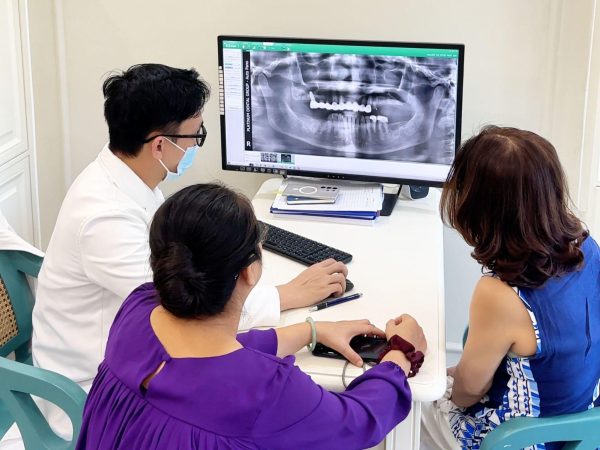
Failure to Follow Post-Treatment Instructions or Missed Check-Ups
After implant surgery, patients must strictly follow the prescribed treatment plan and attend regular check-ups. However, some patients skip appointments or discontinue treatment prematurely. This prevents the dentist from detecting early complications, increasing the risk of implant failure or even rejection.
Poor Oral Hygiene After Surgery
Neglecting oral hygiene is another major cause of implant complications. The implant area must be kept clean to prevent bacterial infection. Improper care allows bacteria to grow, causing gum inflammation, infection, and implant loosening. Bad habits such as smoking or frequent alcohol use also raise the risk of peri-implantitis and hinder bone integration.
How to Prevent Complications and Ensure Safe Dental Implant Treatment
Most implant-related risks can be avoided by choosing the right clinic, qualified dentist, and following post-operative care instructions carefully.
Choose a Reputable Dental Clinic
To ensure safety and long-term results, always choose a trusted dental clinic. At Platinum Dental Group, every implant procedure follows strict international medical standards. Modern facilities, sterile surgical rooms, and dedicated patient care minimize risks before, during, and after surgery.
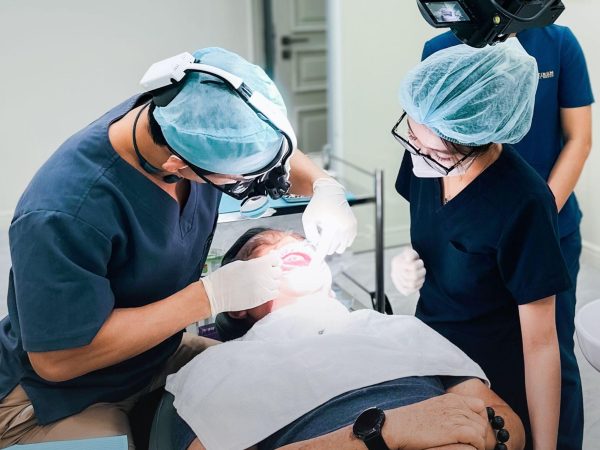
Select an Experienced Implant Specialist
Implant placement requires deep anatomical understanding and years of clinical experience. A skilled dentist can determine the exact implant location and depth, avoid nerve or sinus injury, and handle complications effectively. Platinum Dental Group is home to a team of highly specialized implant dentists, including Dr. Duong Minh Tung, Master – Specialist Level II in Implantology, one of Vietnam’s top implant experts.

With over 16 years of experience, Dr. Duong Minh Tung is recognized as a leading authority in implant dentistry. He graduated from Ho Chi Minh City University of Medicine and Pharmacy, earned his Master’s and Specialist Level II degrees, and completed advanced training in the U.S., France, South Korea, and Singapore.
He also completed over 1,160 hours of continuing education and a 1-year clinical residency at Chang Gung Hospital (Taiwan). With exceptional skill and dedication, Dr. Duong Minh Tung has restored chewing function and smiles for thousands of patients — including complex cases declined by foreign doctors.
Use Genuine, High-Quality Implants
Implant quality directly determines bone integration, durability, and longevity. Platinum Dental Group only uses genuine, certified implants from reputable manufacturers in Korea, the U.S., and Europe, all meeting international standards such as FDA (U.S.) and CE (Europe). This ensures long-lasting, stable, and safe results — potentially lasting a lifetime with proper care and regular check-ups.
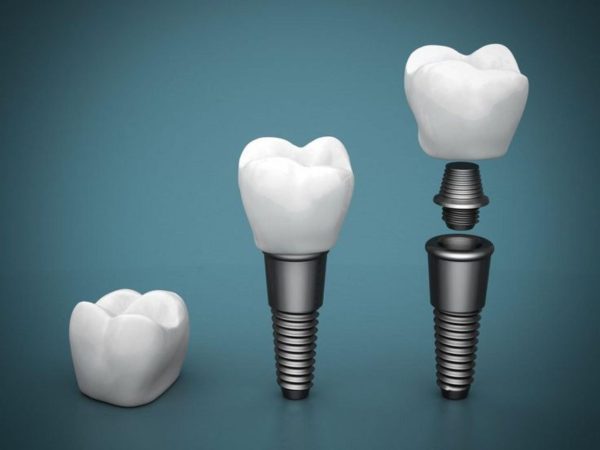
Comprehensive Pre-Implant Evaluation
Before any procedure, every patient undergoes a full oral examination and 3D CT scan. Using advanced Cone Beam CT imaging, our dentists accurately assess jawbone density, oral health, and medical history. We also perform blood tests and systemic health screenings for conditions such as diabetes, heart disease, or hypertension to design a safe and personalized treatment plan.
Follow Strict Sterile Surgical Protocols
Each implant case at Platinum Dental Group is performed under a closed, sterile system that meets international medical standards. All instruments and devices are disinfected using advanced technology, ensuring a bacteria-free surgical environment. Patients are closely monitored throughout the procedure and post-surgery for optimal recovery and safety.
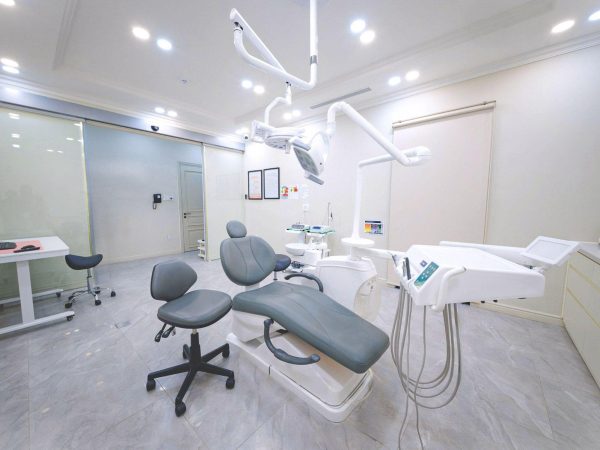
Proper Post-Implant Care
After the implant procedure is completed, the patient’s role in oral care and hygiene is the key factor determining whether the implant successfully integrates with the bone.
Patients should maintain a gentle brushing routine using a soft-bristled toothbrush and clean between teeth with dental floss or a water flosser.

During the initial healing stage, dietary adjustments are also important — avoid foods that are too hard, hot, or spicy to prevent pressure on the implant post. Most importantly, attending follow-up appointments as scheduled allows the dentist to monitor bone integration and promptly address any abnormalities.
At Platinum Dental Group, our commitment to providing safe, durable, and long-lasting implant solutions is a comprehensive process that extends far beyond the surgery itself. We firmly believe that preventing dental implant complications is achievable, which is why our approach is built on a foundation of clinical excellence and patient partnership. This begins with leveraging state-of-the-art equipment, such as 3D CT scanners for pinpoint accuracy, and the deep expertise of our seasoned dentists who operate under strict, European-standard safety protocols.
This clinical excellence is led by our principal specialists:
For surgical precision, meet Dr. Duong Minh Tung, our Head of Implantology and Maxillofacial Surgery. Holding a Master – Specialist Level II in Implantology degree and having received extensive training in the US, France, and Korea, Dr. Duong Minh Tung brings an exceptional level of surgical expertise. His current role as Deputy Head of Maxillofacial Surgery at the prestigious Ho Chi Minh City Odonto-Stomatology Hospital ensures that your implant procedure is performed with hospital-grade standards of safety and precision.
For aesthetic perfection, Dr. Tran Lan Anh, our Head of Aesthetic Restoration. Recognized as the “Top 1 Veneer Specialist in Vietnam,” Dr. Tran Lan Anh is an artist in smile design. With 16 years of experience and advanced certifications from Canada, Spain, and France, she ensures your final implant crown is not just functional, but flawlessly blends with your natural smile for a beautiful, seamless result.
This combination of elite surgical expertise and aesthetic mastery means every stage of your implant journey is handled by a true specialist. Following the procedure, our dedication to your long-term success continues. Every patient receives detailed, easy-to-follow aftercare instructions and is closely monitored through follow-up appointments. This ensures proper healing and empowers you to maintain the scientific oral care habits essential for the long-term stability and durability of your new smile.

Frequently Asked Questions (FAQs)
Is Dental Implant Surgery dangerous?
Dental Implant placement is a modern, widely applied, and highly safe dental procedure globally. However, risks only arise when the procedure is performed at facilities with inadequate sterilization, by inexperienced dentists, or with poor-quality Implant materials. If you choose a reputable dental clinic, adhere to a standardized surgical protocol, and follow proper post-operative care, the risk of complications will be minimized. At Platinum Dental Group, every Implant case strictly follows a rigorous process, ensuring absolute safety for our customers.
Are Dental Implants a good choice?
Compared to traditional restoration methods like dental bridges or removable dentures, Implants are considered the most comprehensive and durable solution. Implants naturally restore missing teeth, provide strong chewing function, maintain facial aesthetics, and prevent jawbone loss (resorption). When properly placed and cared for, Implant teeth can last a lifetime. Therefore, they are the optimal choice for those seeking a long-lasting and safe tooth replacement solution.
What are the potential harms/side effects of placing an Implant post?
In some cases, patients may experience unwanted effects such as peri-implantitis (inflammation around the Implant), prolonged pain, jawbone loss, nerve damage, or Implant rejection. These complications often stem from choosing the wrong dental clinic, the doctor’s lack of expertise, or the patient not strictly following post-operative care instructions. It is crucial for patients to detect signs of abnormality early and contact their dentist immediately for timely intervention.
Does Dental Implant Surgery have side effects?
Like any other surgery, dental implant placement can cause some mild side effects such as swelling, minor pain, or slight bleeding during the first few days. These are normal bodily reactions and will quickly subside with rest, cold compresses, and medication as prescribed by the doctor. If symptoms persist unusually or worsen, the patient should immediately return for a check-up and timely treatment.
Dental Implant placement is not only an effective solution for restoring missing teeth but also provides long-term confidence, aesthetics, and quality of life for the patient. However, to achieve optimal results and minimize the harms of dental implant placement, choosing a reputable dental clinic, an experienced doctor, and a standardized treatment protocol is extremely important.
At Platinum Dental Group, we pride ourselves on having a team of highly qualified doctors, a modern equipment system, and international-standard Implant materials, providing customers with complete peace of mind throughout the treatment process. If you are looking for a safe, durable, and aesthetic dental implant solution, contact Platinum Dental Group immediately for a free consultation and the most suitable treatment plan for you!
>> Discover:
- General information about Veneer teeth
- General information about Dental Crown treatment
Platinum Dental Group
Clinic Locations:
📍Platinum Dental Central: 127 Nguyen Cu Trinh Street, Cau Ong Lanh Ward, Ho Chi Minh City
📍Platinum Dental Thao Dien: 1H Street 10, An Khanh Ward, Ho Chi Minh City
📞 Hotline: (+84) 28 3920 9969 | 096 779 7799
✉️ Email: info@platinumdentalvietnam.com
🌐 Website: https://platinumdentalvietnam.com/
💬 Instagram: https://www.instagram.com/platinumdental.vietnam/
🔗 Facebook: https://www.facebook.com/platinumdentalvn



 Tiếng Việt
Tiếng Việt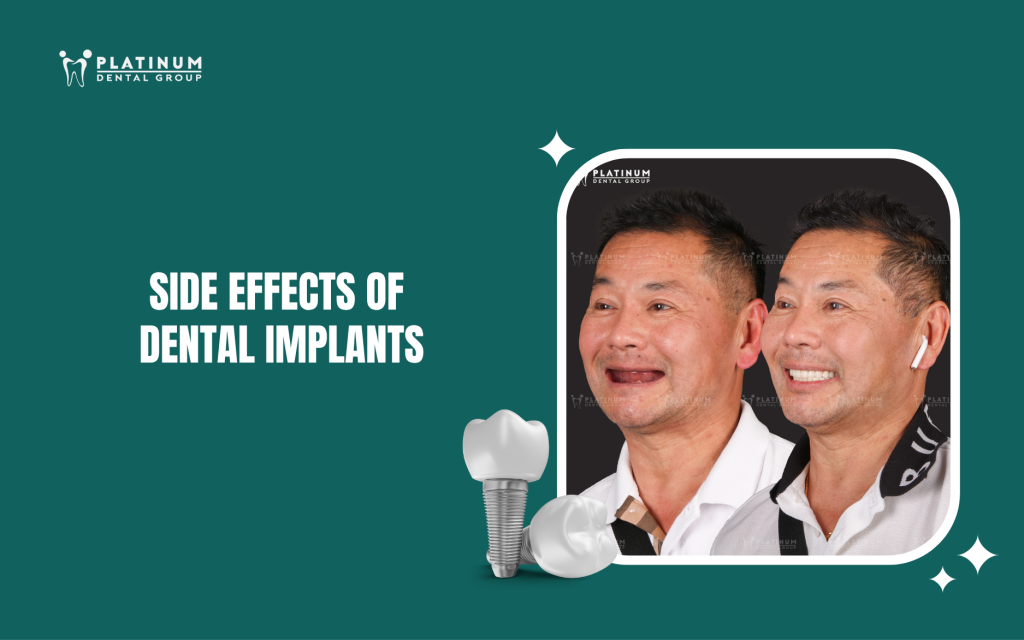
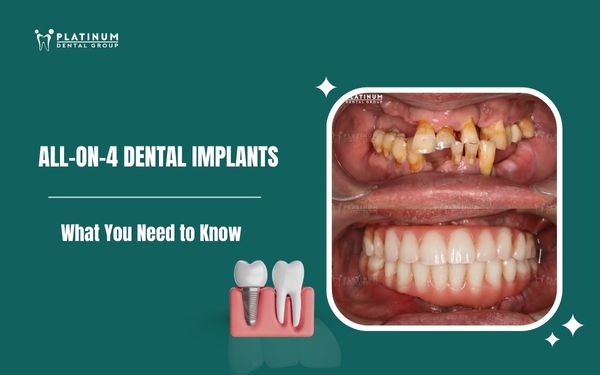
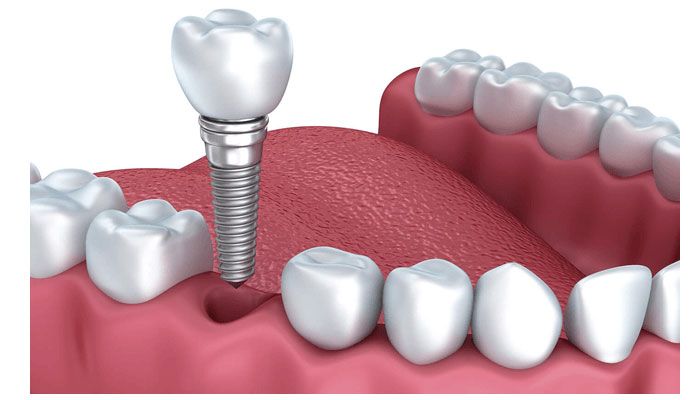

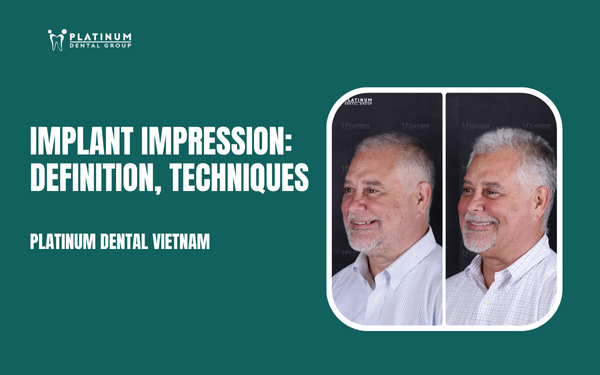
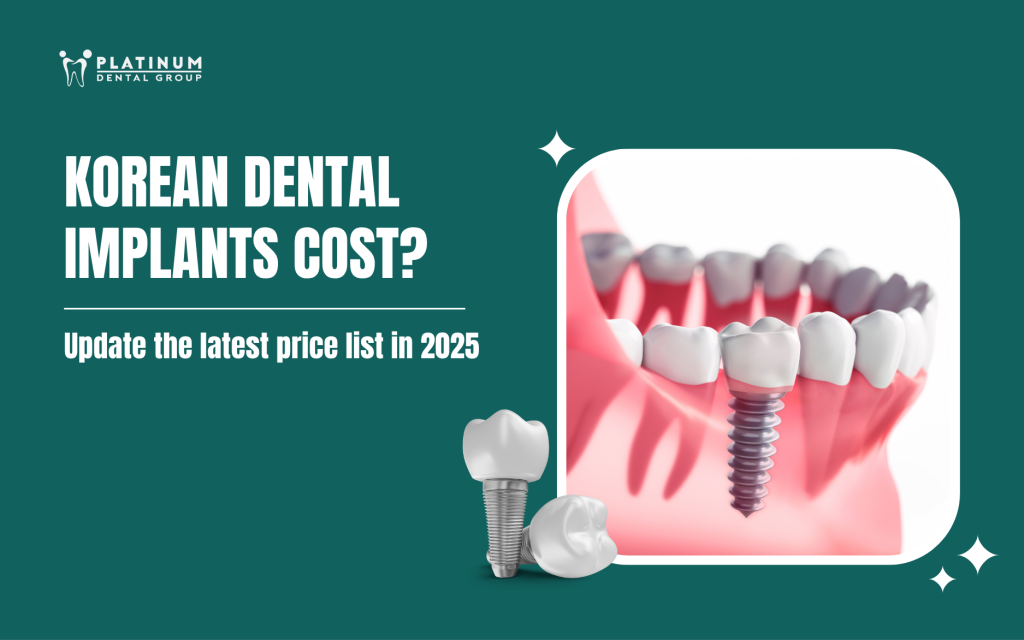




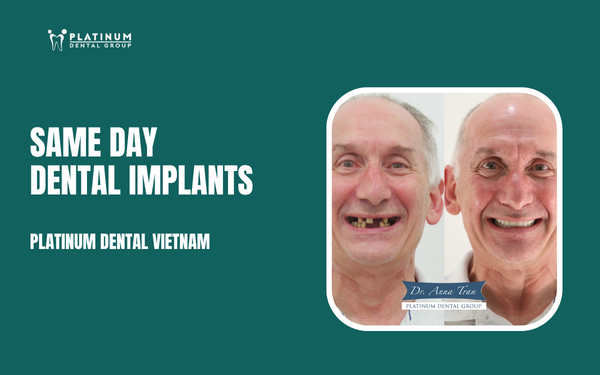
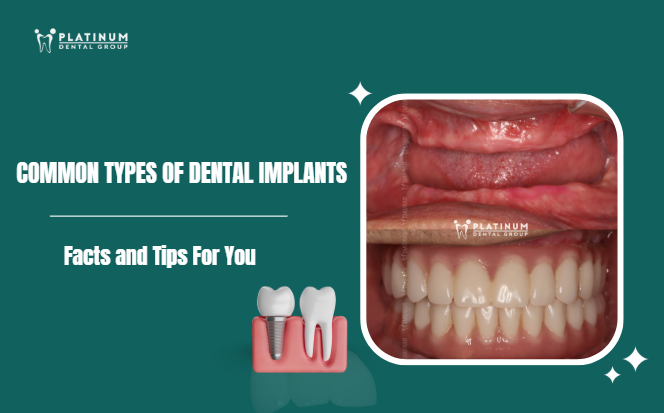
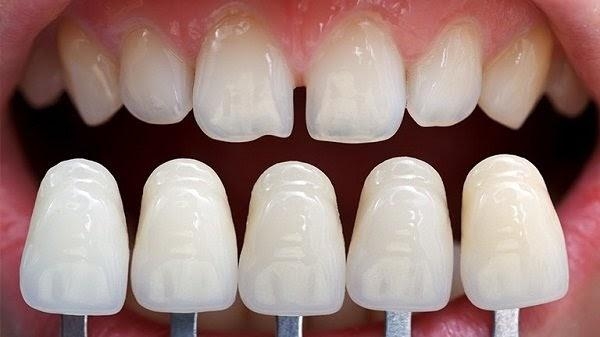
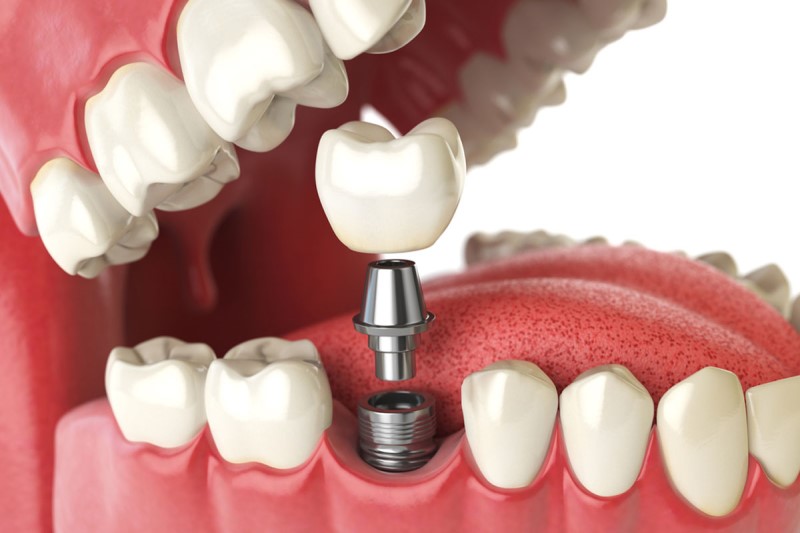




![[Updated 2025] How long does the dental implant process take? Influencing factors 31 how long does the dental implant process take](https://platinumdentalvietnam.com/wp-content/uploads/2025/11/how-long-does-the-dental-implant-process-take-4.jpg)
